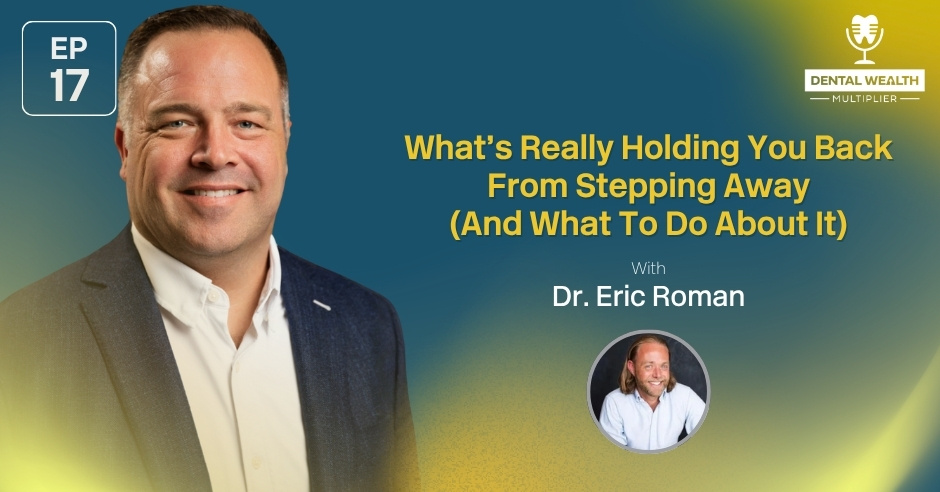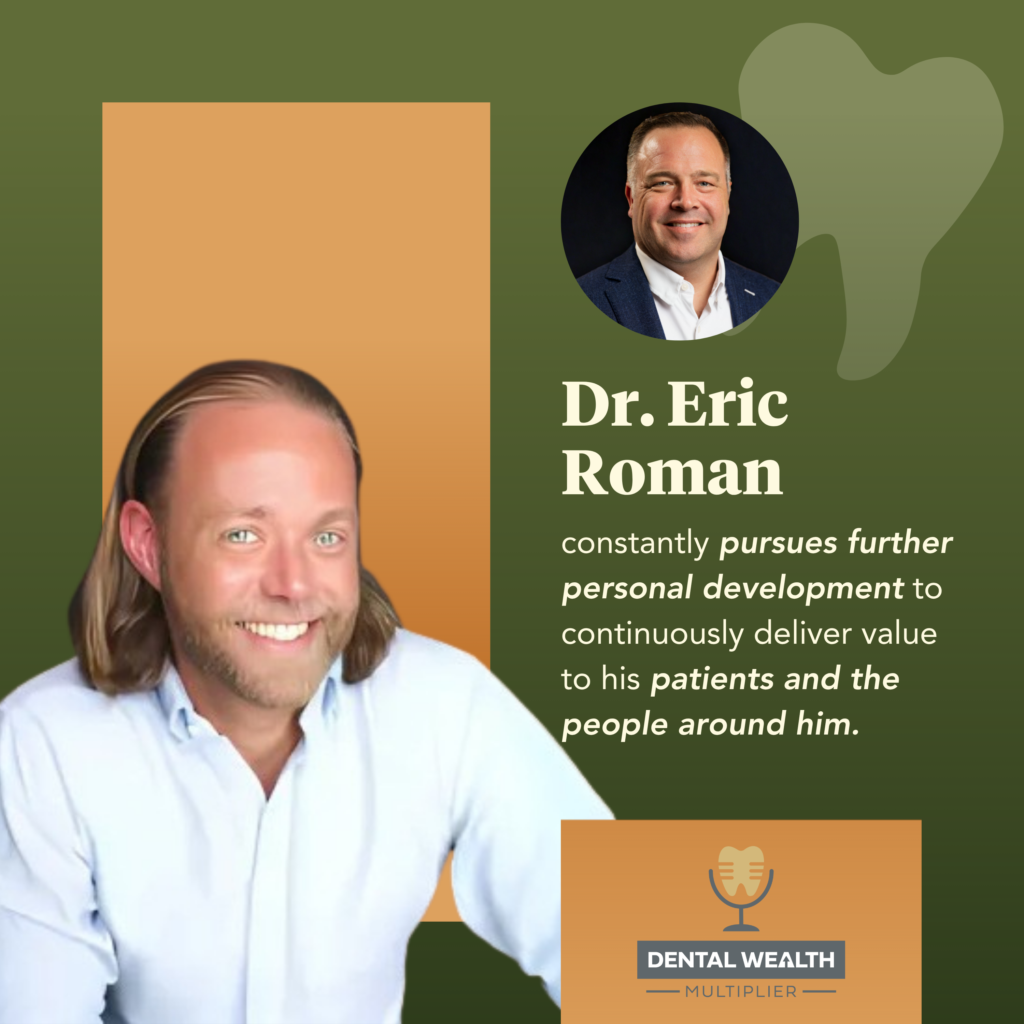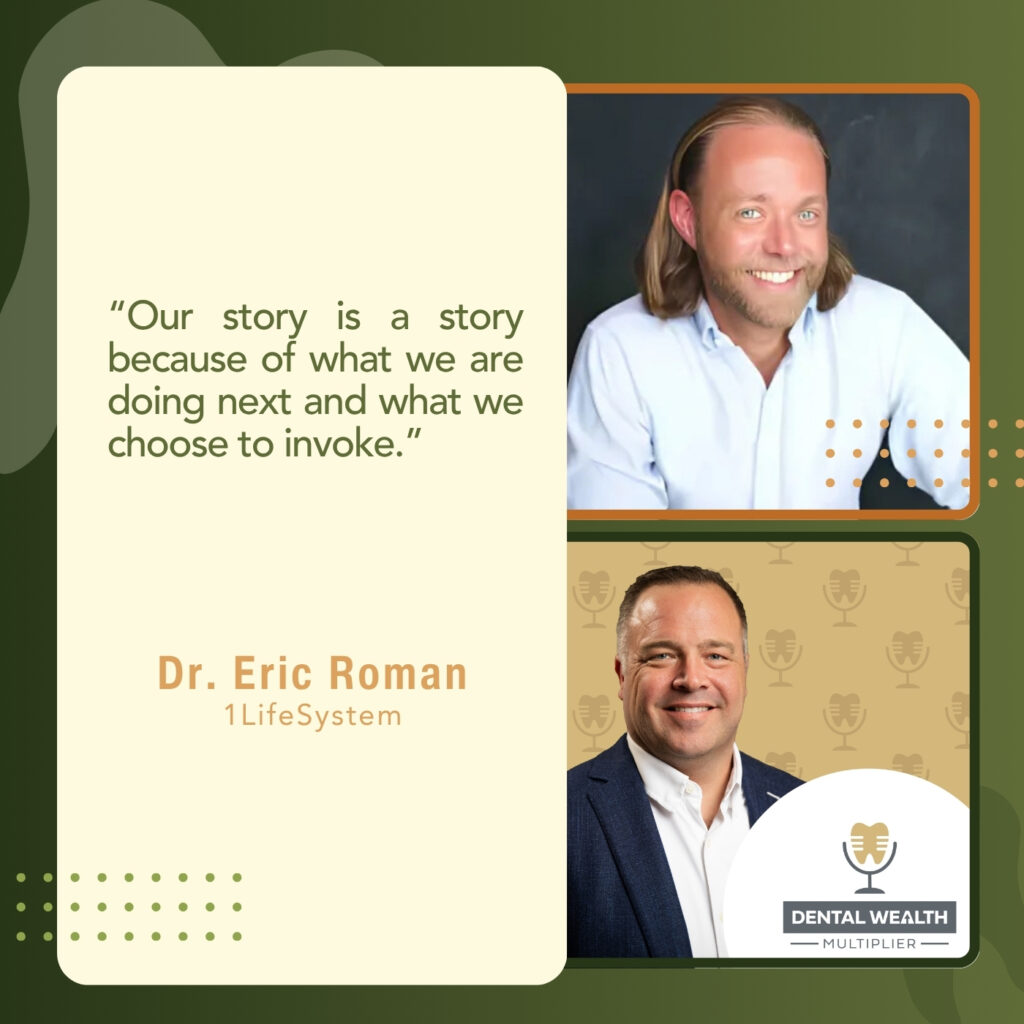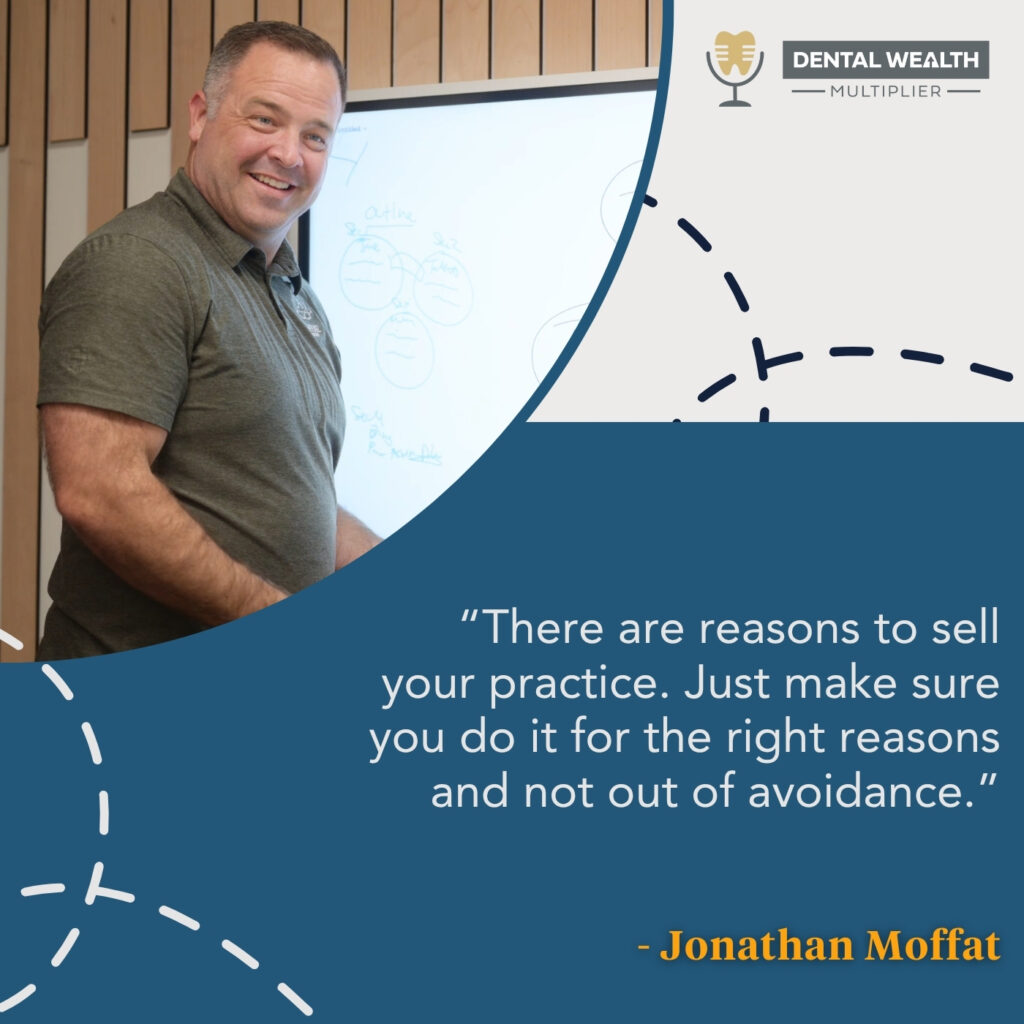
Dr. Eric Roman joins Jonathan Moffat to unpack the real reason why stepping away from your business is extremely difficult to do. They explore the mindset shift required to go from operator to true owner, how identity and control can quietly sabotage your growth, and what it takes to build a self-sustaining dental practice. They also emphasize why real work is not operational but actually emotional, requiring you strike the right balance of your heart, mind, and soul. If you have built the structure but still feel stuck, this is the conversation you did not know you needed.
Find Jonathan at jonathanmoffat.com
Learn more about Aligned Advisors at alignedadvisors.com
Connect with Dr. Eric Roman at drericjroman.com
Find Jonathan on LinkedIn: linkedin.com/in/jonathanmoffat1
Find Dr. Eric on LinkedIn: linkedin.com/in/drericjroman
—
Watch the Episode here
Listen to the Podcast here
What’s Really Holding You Back From Stepping Away (And What To Do About It) With Dr. Eric Roman
What Makes A Top Performer
I’ve been stuck on this concept about what makes top performers top performers. It was a topic of a talk I gave. It’s something that I’ve been fascinated by. I was sharing with you before we hit record that I went to a sports camp with my kids. You get to interact with some of these D-1 collegiate athletes, football players, basketball players, and tennis players. It’s cool that the kids get to interact with them.
I remember one of the coaches turned to the basketball team of this school. He goes to four of the top basketball players right there and asks, “How many shots a day do you take?” He goes, “500 shots a day.” He asks, “How many do you take?” Someone answers, “600.” He asks, “How many do you take?” They were joking, like they were trying to one-up each other.
The coach is like, “I can tell you personally that I know that every one of these guys takes at least 500 shots a day.” You get Tiger Woods and Jack Nicklaus. The top performers, what do they do? You’re a baseball player. Tony Gwynn was notorious for going out, doing batting practice, videoing it, and watching the film late at night. Every other Major League Baseball player or anyone who wants to be could do that work. Yet, very few of them did. The technology is there to help.
It goes back to that no more excuses thing. At the end of the day, it’s the toughest pill to swallow. I’ve been there. I ebb and flow through there. I’m not perfect with this. I have days where I get up and I’m like, “I don’t feel like putting in the work today.” At the end of the day, that’s the only excuse you’re going to have.
It’s, “I don’t feel like putting in the work. I don’t feel like going and learning new technology. I don’t feel like holding my team accountable. I don’t feel like delegating these tasks to a team of people who could create my SOPs and training. I don’t feel like doing it. I don’t want to do it.” That’s okay. The result of that is going to be you’re going to be burned out. You’re going to get to a point where you don’t want to do dentistry anymore.

You’re going to be frustrated by everybody else who’s growing faster than you.
You’re going to be frustrated by everyone else. You’re going to be frustrated by, “My XYZ colleague at my study club said he sold his practice.” The reality is you can also get there. Something that you and I both see eye to eye on is this idea of how you can turn your practice into an investment. How do you go from operator to investor?
Every single person tuning in to this can do it. I’m telling you that you can all do it. Eric has done it. I did it. I’m not a dentist, but we did it with our practices. We were doing $14 million a year in revenue. I was working 2 to 3 hours a week on that business. That was it. You did it. I did it. Everyone does it a little bit differently. The point is, if you’re tuning in to this show, we’re telling you you can do it. It’s not that hard. You just have to make the decision to do it. That’s it.
How The Outlier Performance Mindset Changes Everything
You hit on something more intriguing. I heard dental school data that high-performing college athletes perform well in dental school. When I was in dental school, I knew there was a surprisingly high number of fellow students who were NCAA Division 1 athletes. I heard that there was a data correlation. They looked at it, and they were like, “How do these dentists turn out as we go along? What are the qualities?”
You pointed something out. You pointed out the mindset and the approach of high-performing athletes. The mindset and the approach of high-performing athletes are, “Do hard fricking things every day. Find solutions. Do your 500 freaking shots every single day. Do your 500 shots with great form. Master your diet. Recover like a mofo.” What is LeBron spending? $2 million or $3 million a year just on recovery? Do the things that other people aren’t willing to do to have an advantage that other people won’t have.
Is it perhaps that outlier performance mindset is what’s making the difference that we talk about in the shift? Is it possible that that’s the upper echelon of the top 10% of dentists, which are the ones we tell stories about? They’re the ones that pull the trigger and the ones that do the stuff. What would it look like for us to have a categorization of the mindsets of dentists in that top 10% that’s like, “I’ll do what other people won’t to have what other people can’t.” It is acknowledging that. I see it in my son as an athlete. He doesn’t have it. I love him. Maybe he’ll discover it. I didn’t uncover it until I was in college. By grace, I was good enough to be a D-1 college athlete. That’s interesting. I’m an example. I hadn’t even thought about that.
I thought you said it.
I didn’t even say it.
For those of you who don’t know, Eric played D-1 baseball, right?
Yeah. I played at Florida State. We were the number one team in the country. I was on stage every single day in the most important games in the United States. I didn’t have that when I went in, but I uncovered it while I was there. There’s no light too bright that scares me. When everything is on the line and the ball is in my hand, it’s like, “I’m here. This is what I prep for. This is what I play for.”
What I think is important to notice is that for some people, they can uncover that on their own. Those are even a fraction of a percentage of people who are like, “I’ve uncovered this on my own.” My sport was soccer. I played soccer growing up. I only played one year of soccer in college. Anyone who played more than a year of collegiate sports, my hat goes off to you. I have no clue.
There is a line in the sand.
High-performing athletes do the hard things every day. They do what other people are not willing to do. Share on XIt is amazing. A lot of respect for you guys. What was interesting is that I’ve gone back, talking about coaching. If you were to pinpoint one point where you went from average, like, “I’m okay,” to “I’m a top performer,” what was it? For a lot of people, it was, “I had a good coach. I had someone who had the blueprint of what to do. They held me accountable. They didn’t let me off the hook. They coached me. That’s how I got from here to ultimately where I wanted to be.” What’s even more interesting about that, going back full circle to how you started off our recording around your upcoming training for associates, is what do even the elite performers have? They not only have coaches, but they have specialized coaches for everything.
For my personal wealth, for my mindset, for the way I carry myself and my family, and for three different assets in my practice, I got a hygiene coach and an executive leadership coach. We’ve got a coach for our associates. You nailed it.
No one is an expert in all things. You and I both talk about this all the time. What’s interesting, too, is as you’re saying this, I’m rattling through my brain of our top performing clients. Guess what? They have a coach for their hygiene. They have a coach for their associates. They have a coach for leadership. They make time to work on leadership to reflect on their practice and their businesses.
In an effort not to sound like, “Jonathan and Eric, you sound like every other show out there,” I get it, but guess what? Fundamentals work. It’s not more complicated than that. I know we want it to be like, “Buy this equipment,” or “Sign up for this technology,” or whatever. Those things are aids. Those should aid you. At the end of the day, it’s who’s willing to wake up, who’s willing to do the hard thing, and who’s willing to sit there and run the morning huddle when no one else feels like doing it or when the team is like, “I don’t want to be here.”
Doing The Hard Work
You show up, put your pants on, put your A-game on, and say, “I know you all are down. Pull your crap together. Our patients don’t give a crap. They need us in our A-game today, so go find your A-game.” I will add one caveat. You are 100% correct. It is not just the coach’s environment. Let me say it in a different way. It is a community.
I love my coaches. They were great. The thing that had as much of an impact on me was the other dudes who showed me what was possible by shifting their mindsets and showed me what hard work looked like. It was the other guys who, when I got there for practice, had already been there for two hours working out. I was like, “I was so tired yesterday. I was swamped.” They said, “I don’t care. Tired don’t get us back to Omaha.”
That was the pervasive thing. I was like, “There is another level that I can dig down into.” I had a choice. Do I allow the environment to change my approach, or do I allow the environment to suppress my approach? I know a lot of people that the environment, they’re like, “It’s not me. I’m out. It’s good. Thank you.” The higher you go in sports, you’re cultivating that.
I bet you it’s the same thing here. I’ve noticed it. When I operated in the most elite DSO building communities, they all had that mindset. They were all focused on their development, their growth, and their coaching. They were all focused on this stuff. That’s why they’re still my clients. They’re reaching out and saying, “Eric, help me with this portion of my business. Help me have better systems for developing doctors.” They know the game. It’s pretty logical what we’re talking about, but it’s hard.
I think so, too. I give this example. There are people whom I’ve seen in my life. I grew up around entrepreneurs and business owners who were always looking for that silver bullet. They were like, “If I sign up for this course or pay this person, all my business problems are going to be solved.” They’re let down because that didn’t happen. They’re then like, “That was a waste of money. This guy says he can do that. I’m going to spend money there.”
Between you and me, we probably talk to 30, 40, or 50 doctors a week. I have no clue. No one wants to hear it because it’s the same thing as, “How do you get into shape?” You eat healthy and exercise. No one wants to hear that. It’s hard. Consistency is hard. Being consistent and being disciplined is very difficult. What separates the top performers from the rest is that they’re consistent. They have hard conversations.
I go back to an interview that you and I did with one of our clients who has a nine-location group in Chicago. If you guys want to check it out, it’s Areo Dental. They talk about this in that episode. They’re one of the top-performing groups. What do they do? They’re like, “We’re purposeful with who we’ve hired. If they’re not a good fit, we get rid of them quickly. We only hire top performers. We spend a lot of time reinvesting back into our team training.”

They’re very purposeful with that. Because they’ve been able to do that, what have they done? They’ve gone from operator to investor. They’re not clinical. They’re working on how they run the practice, and that sort of thing.
Dr. Eric’s Five-Step Program For Change Management
One of the things I’d like to do, and I’m throwing this out there, so I’d be curious to see what you come up with, is, for the people tuning in, give them something actionable and tangible. If they’re tuning in, it’s like, “Go do this to be that first step towards moving in this direction.” I have a couple of ideas. I’m happy to go first. If you have a couple of ideas, I’d love to know what your thoughts are.
This is change management. That’s what coaching is. Coaching is change management. What you’re asking is what’s the first step for somebody who says, “I want to be better.” I’ll offer mine. The first reason that we have to ask that question is that we have to figure out what the benefit is to us of things being there. What I mean by that is the vision of a better future.
It’s not enough to say a bigger practice, making more money, or whatever else. It’s what comes out of this. What changes about you because of the thing that’s there? If it’s not sweet enough, not sexy enough, and not desirable enough, you’ll never make it. Honestly, it’s one of the biggest problems in my life. I’ve already made great money, and some days, I’m like, “That’s not great enough. That’s not going to change anything for me.” That’d be great short-term, but I don’t want it long-term.
You have to be hungry for the future that you want. That’s step one. The second thing is it’s got to be in writing because every day things change. If we don’t establish where we’re going in writing, there’s no energy. We’re going to lose focus. We’ll be like, “I totally forgot.” The third thing is that it has to go from writing on the wall to actions every day. You have to know what it is. You have to know why you’re doing it, and you have to go do it. It’s got to be in your schedule.
The fourth thing is that there’s got to be shared accountability. If I don’t tell my brother Jonathan, “Jonathan, I need you to hold me accountable that I’m doing this. I’m holding you accountable that you’re doing your thing,” I am not going to get anywhere inside of it. The fifth thing is you have to call a timeout every once in a while and say, “Hold on. 90 days ago, I said this was the thing, and this is what I’m fighting for. Where am I? Am I on track or off track? Do I still want it? What do I need to adjust to be able to move faster and more effectively?” You then dig back in and start your cycle again. That’s my Eric Roman five-step program for change management.
I love it.
What would you do?
I heard you have to have the goals, write them down, and share them with someone to hold you accountable. What was number five?
Refresh. You have to call a timeout, assess where you are, make the adjustments, and go do it again.
I love that. The thing that comes to mind for me is if you’re sitting and reading, and you’re like, “I don’t even know where to begin,” I would echo everything Eric said. I would also say to start writing down the activities of your day that you either love to do where you think, “If my day was filled with this or if all I do is this, I would be so happy,” or the activities you don’t love to do or hate to do. List those out. What are those things?
An exercise that we go through when I speak is that you list out all the things that you do. What is your day filled with? It would be like, “I see patients. I do this.” The next column is, “Can you delegate that to someone?” Sometimes, it’s yes. Sometimes, it’s no. If it’s yes, great. The next column is, “Who can you delegate that to? Do you have someone on your team you can delegate that to?” It’s either yes or no. If it’s yes, who’s that person? Finally, when are you going to have that delegated?
You have to be hungry for the future you want. Share on XStart to identify those things that you’re spending your time doing that don’t give you value, and you don’t get joy out of. Should everything be fun? No. Everything shouldn’t be fun. If you’re going to make this shift from operator to investor, if you want to make this shift from burnout to excitement, which we all go through, everyone goes through it, you have to start with identifying, “What are those things that are causing me the burnout? What are those things that give me excitement?”
I start filling my bucket with more things that gimme excitement and fewer things that give me burnout. If you do that, you’ll notice a massive shift. You’ll notice a renewed energy, focus, and excitement for your business and your practices. I love this question. Someone asked me this question years ago. At this point, I was feeling burned out. I was like, “I don’t know how much longer I could do this.” They go, “Let’s say you sold your business, Jonathan. What would you do?” I go, “I’d go start another business.” They say, “Maybe selling a business isn’t the right solution.”
Identify those things that are adding value to your life or causing you pain or burnout. Start identifying those and start shifting those things that are giving you burnout out of your life to make more space for things that are adding value. I bet you that if you do that, you’ll be a little happier. You’ll find a little more joy in your days and renewed excitement.
If my wife were on this show, I could tell her the date, and she’d go, “That’s when I saw a new energy lit in him.” That’s a big piece, but that takes work. Do you need to go to therapy to do that? Absolutely. I’ve talked about EMDR here. We’ve talked about that. That helped me out years ago get a lot of clarity around where I was at, and helped me move through. That’s okay. There’s nothing wrong with needing therapy, needing help, and needing coaching, especially when we’re trying to do something hard and which a very small percentage of business owners, let alone dentists, figure out how to do.
You’re going to need coaching. You’re going to need help, accountability, and all those things that Eric talked about. You’re going to need the guidance of someone who’s done it or people who have done it. There are reasons to sell your practice. Make sure you’re doing it for the right reasons, not out of avoidance. There are right times or right reasons to sell. Make sure you’re doing it for the right reasons.
Unlocking Power Through Energy Conversion
What I loved about what you’re saying is that you focused on a lot of energy. You talk about positive energy stacking. One thing that I might throw in there, too, is that sometimes, when we’re in a rut, we need an energy conversion. We need that proverbial firecracker up the butt. I recognize that that’s what sometimes good communities do.
I have a unique community of people in the dental industry that meet together at my home every 90 days. It’s usually about 30 people. It’s about 100 in the total community. What I’ve started to acknowledge is that what the event provides is that it pivots people’s energy. If you’re already on a little bit of fire, it might turn you into an atomic energy source. Sometimes, when your energy is off, it’s one of those things that turns people and fires them back up.
Sometimes, that’s the power of events. Maybe your jam is a Tony Robbins event. Maybe there’s another industry event or something like that that you go to. Do you know what I love? I feel like when an event is done well, the majority of the audience comes out of there with fire. They’re like, “That was a great idea. I can do this. If that idiot, Eric, can do it, I’m fine.” I acknowledge and put a pin in that one as well. Sometimes, our response when stuff is hard is that we go internal. We turn inward. I’m sitting in that myself. I’ve been working hard. Maybe I need to turn that in.
It can be a lonely road. Entrepreneurship can be a lonely road. We’ve talked about that. It doesn’t have to be. Going back to technology and community, there’s LinkedIn and Facebook. There are so many communities out there of people going through what you’re going through. If you don’t know of any, email Eric or me. We’ll point you in the right direction. We’ll send you a couple. There are a lot of communities out there, no matter where you’re at. Hopefully, no one is feeling that kind of aloneness. If you are, please email us. We’ll point you in the right direction and get you connected with some people.
Let me re-say that. Somebody is. We know it’s true. You’ve been there, and I’ve been there. We’ve all spent our time there. We’ve all spent our time in the pit of despair. We don’t want anybody there, but odds are, there’s a pretty good percentage of people who are reading that are there. That would only be normal. I want to normalize that. Lovingly, we’re saying, “Let us help you get your butt out. Let’s go do it. Let’s go find your friends. Let’s go find the group. Let’s go find the energy. Let’s do this stuff. If the 1st doesn’t work, go find a 2nd. If the 2nd doesn’t work, find a 3rd.”
What would the stories be like for all the famous athletes if the failure and the loss were the defining moments? What if that was the end? We’d have no Jordan if not making the high school team was the end of the story. Nobody would even tell the story of a story because of what happened next. Maybe that’s an encouragement for all of us. Our story is a story because of what we’re going to do next.
If achieving success were easy, everybody would be doing it. Share on XLet’s stick with the baseball theme. Eric, what’s a good batting average?
A good career batting average is 2.75.
Let’s think about that for a second. For every 10 at-bats, you’re getting 2.75 hits. That means you’re striking out or getting out. What’s the reverse math on that? 7.75%?
Yeah.
That’s a professional athlete who is getting paid a lot of money to play baseball.
If it’s 7 out of 10 failures, there’s a good chance you’re making the Hall of Fame.
Think about that next time you’re feeling bad for yourself. Many people probably don’t have 7 out of 10 failures every year. Most dentists probably quit. If 7 out of 10 dentists have failure, you’d probably think, “I’m not doing this anymore. I’m out.”
All It Takes Is One Success
Isn’t that interesting? The other thing about that is that it takes one success. Let’s say you failed your first five times. It just takes one to win and to succeed for it to be fine.
It’s the same thing with employees. You may go through 6 different associates, 5 different hygienists, or whatever that is. There are a lot of people who throw in, “It’s not working. I don’t think that associate is for me. I’m going to keep doing this by myself until I physically can’t do dentistry anymore.” Maybe that next associate could be the one. Maybe it’s not the associate. Maybe it’s the training. Maybe there’s a lack of systems.
I was talking to a client who’s losing an associate. I said, “What’s going on?” He goes, “We couldn’t find a hygienist for the associate. The associate told us, “If I don’t have a hygienist, then I can’t do hygiene checks. I can’t stay here anymore. It’s not working.” They didn’t find a hygienist, so the associate is like, “I’m leaving.”
Sometimes, we know why they leave. Sometimes, we don’t. It doesn’t matter whether we do or don’t. Certainly, try and do exit interviews. That’s an important thing. Try and learn as much as you can so that you can improve. Going back to the top performer mentality, whether you know it or not, you brush yourself off and get another associate. You keep pushing forward. You shouldn’t allow that to derail you from the plan or the path that you’re on.
That’s what I liked about what you said about your five steps. Number one is that why. That purpose has to be so strong. Do you know how long I’ve been trying to get myself out of the operating role in my business? Three years. Do you know how many times I’ve thought, “This isn’t worth it. This isn’t working. I’m going to settle.” A lot. A few months ago, as I was getting ready for the day, I looked at my wife and was like, “Am I doing the right thing here? This is hard.”

I get you. I see you.
I have someone who I think is going to be the perfect integrator-operator. I’m already feeling a lot of momentum, and that’s great, but guess what? I also know it might not work out, and that’s okay. I’m committed to this path. If he doesn’t work out, I’m going to go try and find someone else. If that person is not going to work out, I’m going to find someone else.
Why Success Can Never Be Easy
I believe, at my core, that my business is the best residual income investment that I could potentially make, like I believe, at my core, with the dental practice. If you believe and want that, you can do it, but it’s not easy. It’s hard work. It’s consistency. It’s doing the hard things. It’s everything we’ve talked about in this episode. The good news is you’ve got a community of people who support you. Reach out to Eric and me if you need to find those people. We are those people. We’re happy to support you. Continue to stay on that journey. What do you have for us? Any parting words or thoughts?
If this were easy, everybody would be doing it.
I love it.
Everybody is not doing it. I don’t throw shade to convict people for not doing same-day crowns and stuff like that. I get it. I’m sure there’s an equally valid argument. I’m acknowledging that change is hard for all of us. If there’s one thing that sits underneath this, it’s change. It’s one thing to support change in a practice, in your family, or in another person, but changing yourself is the worst and hardest thing to do. I’m the most stubborn mofo you’re going to find. Everything you say, I ditto. I’ve been in a rut. I get up, look in the mirror, and I’m like, “Are you going to create any value for anybody today? Am I doing what I’m doing? I need to go get a job and work for Jonathan because he clearly got everything together.” The stories we all tell.
That’s the beauty of what you said. I don’t think anyone has it all figured out, or anyone has got it all together. There are moments where you do and where it feels that way. I’ll go back and say something I’ve talked about before. With our practices, when everything was good and running well, I’d look at my operator and go, “Crap,” because I knew it was about to change. I knew it wasn’t going to stay that way very long.
You’re right. That is the thing. This is good.
It’s all good. We’re in the golden age of dentistry. There’s never a better time to be in this space or this business. Every day, we’re faced with different challenges, but it’s all good. It’s all good stuff.
That’s perfect. I appreciate you.
Important Links
- Dr. Eric Roman
- Dr. Eric Roman on LinkedIn
- Dr. Eric Roman on Instagram
- 30% Profit Across 7 Practices: From Operatory to Enterprise with Dr. Anushka Gaglani and Dr. Abhishek Nagaraj of Areo Dental
- Jonathan Moffat
- Jonathan Moffat on LinkedIn
About Dr. Eric Roman
 Dr. Eric J. Roman started his professional journey as a dentist, but soon became the CEO of fast growing, multi-location dental groups that generated over $200m in care during his leadership. Eric strategically led his DSO through an exit in 2019, and chose to step out of DSO leadership to pursue a more balanced life.
Dr. Eric J. Roman started his professional journey as a dentist, but soon became the CEO of fast growing, multi-location dental groups that generated over $200m in care during his leadership. Eric strategically led his DSO through an exit in 2019, and chose to step out of DSO leadership to pursue a more balanced life.
His next growth phase came in the form of executive coaching and thought leadership, both inside and outside the dental industry. As one of the dental industry’s most esteemed experts on team dynamics, emerging DSO operations and associate dentist development, Eric spent several years coaching a community of more than $3B in annual revenue via the Dentist Entrepreneur Organization.
After his tenure at the DEO, Eric shifted his energy toward addressing an alarming trend: data is showing that, despite the success of our businesses, entrepreneurs and their teams are continually less fulfilled in their personal lives. To solve this, Eric developed the 1LifeSystem, a simple, recurring digital retreat that delivers personal fulfillment without sacrificing professional success. Whether it’s as a founder, operator, advisor, or investor, Eric loves to put his energy toward moving our industry forward.
